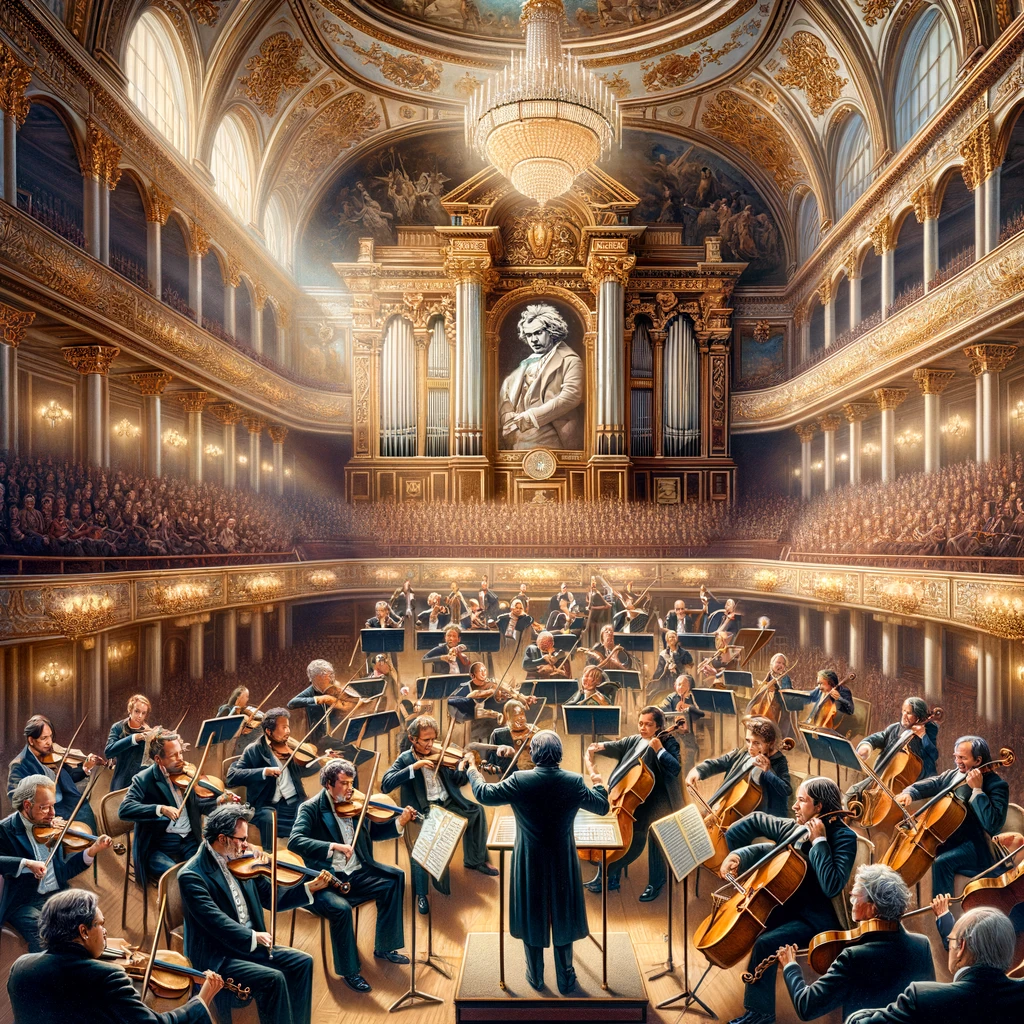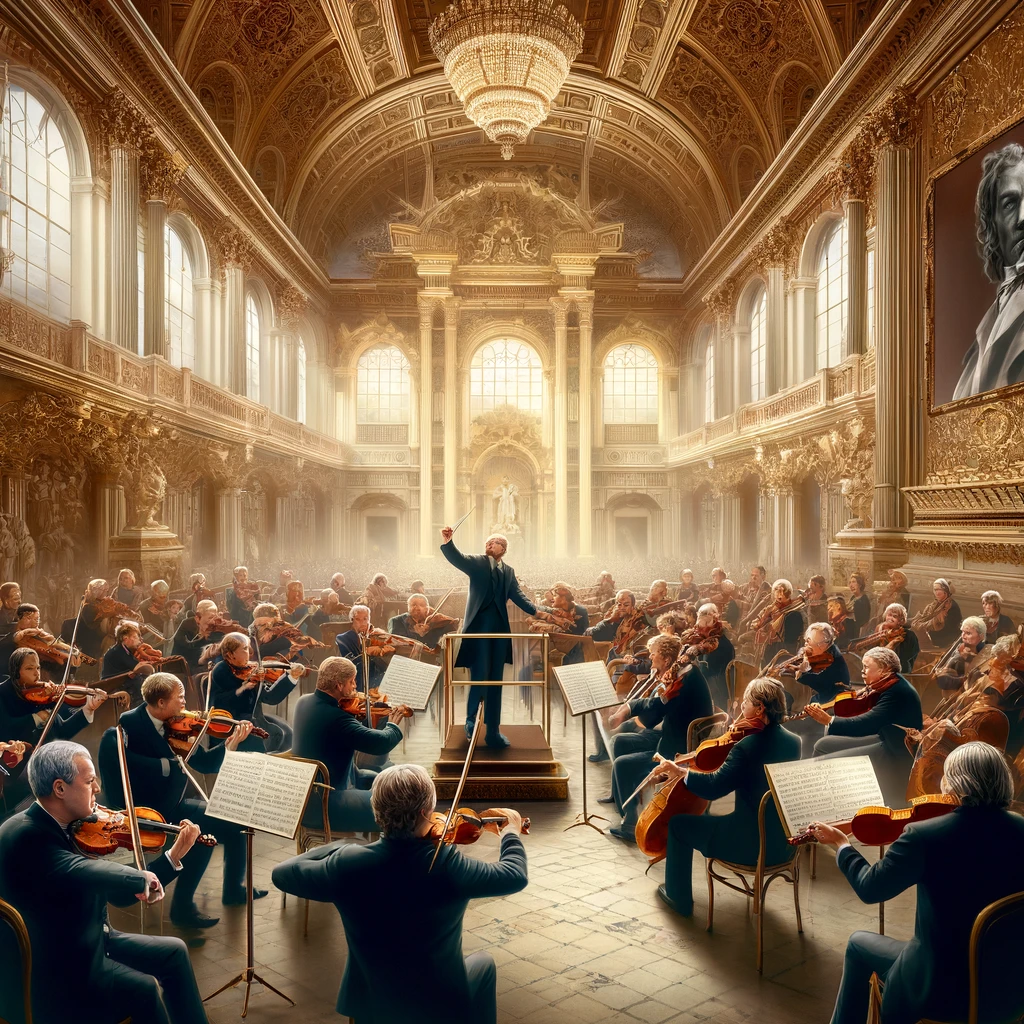
The Vienna Philharmonic’s Timeless Tradition with Beethoven
Ludwig van Beethoven remains one of history’s most eminent composers, with an indelible influence on classical music. Despite the many challenges he faced during his lifetime, including hearing loss, Beethoven’s legacy endures through his groundbreaking compositions. One ensemble particularly notable for perpetuating Beethoven’s legacy is the Vienna Philharmonic. This orchestra, rooted in the heart of classical music heritage, has been instrumental in preserving and showcasing Beethoven’s works for generations. Renowned for its tradition, the Vienna Philharmonic embodies the spirit of Beethoven’s music, interpreting and performing his symphonies with unparalleled dedication. The relationship between this legendary composer and the iconic orchestra is a testament to the enduring power of Beethoven’s music.
The Vienna Philharmonic and Its Historical Importance
The Vienna Philharmonic Orchestra, founded in 1842, stands as one of the most prestigious ensembles globally. Its significance in the classical music world cannot be overstated. From its inception, the orchestra sought to bring the works of prominent composers to life, with Beethoven’s compositions becoming central to its repertoire. Located in Vienna, a city that was both Beethoven’s home most of his life and a cornerstone of classical music, the orchestra’s environment was ripe with inspiration. The Philharmonic’s commitment to high artistic standards and their close ties to Beethoven’s music have forged a deep-rooted tradition.
Over the decades, the Vienna Philharmonic has worked with many distinguished conductors, each bringing their interpretation of Beethoven’s works. This collaboration has resulted in performances that not only honor Beethoven’s original compositions but also infuse them with new life and energy. The orchestra’s adherence to traditional techniques, combined with innovative approaches, has cemented its status as a custodian of Beethoven’s musical heritage.
Beethoven’s Early Influences and His Revolutionary Works
To understand the significance of the Vienna Philharmonic’s performances of Beethoven’s works, it’s essential to delve into Beethoven’s early influences and his revolutionary approach to composition. Born in Bonn in 1770, Beethoven was exposed to music at an early age. His father, Johann van Beethoven, was a musician, and he recognized his son’s prodigious talent. Beethoven’s early works were heavily inspired by the giants of the classical era, such as Mozart and Haydn. However, Beethoven’s music evolved to break the boundaries of classical forms, paving the way for the romantic era.
Beethoven’s compositions were revolutionary in many respects. He expanded the scope and structure of symphonies, sonatas, and string quartets. His willingness to experiment with form, harmony, and emotion set his work apart from his contemporaries. Among his most revolutionary compositions are his nine symphonies, which remain at the core of the Vienna Philharmonic’s repertoire. The 5th Symphony, with its iconic four-note motif, and the 9th Symphony, with its choral finale, are particularly noteworthy. These works illustrate Beethoven’s profound emotional depth and his ability to communicate the full spectrum of human experience through music.

Landmark Performances and Recordings by the Vienna Philharmonic
The Vienna Philharmonic’s interpretations of Beethoven’s works are some of the most esteemed in the classical music world. Throughout its history, the orchestra has delivered landmark performances that have been captured in recordings, allowing a global audience to experience their artistry. One of the most historic performances was the Philharmonic’s 1936 recording of Beethoven’s 9th Symphony under the direction of conductor Felix Weingartner. This recording is often regarded as one of the finest interpretations of the symphony, capturing the orchestra’s mastery and deep connection to the work.
Another significant performance was the series of Beethoven symphonies conducted by Leonard Bernstein during the 1970s. Bernstein’s interpretations brought a unique passion and intensity to the performances, which were both recorded and televised, reaching an even broader audience. More recently, the Vienna Philharmonic has continued its tradition of excellence with performances led by conductors such as Riccardo Muti and Christian Thielemann. Each of these interpretations offers a distinct perspective on Beethoven’s music, showcasing the orchestra’s versatility and unwavering dedication.
The Vienna Philharmonic’s Interpretative Approach
The Vienna Philharmonic’s approach to performing Beethoven’s works is deeply rooted in tradition while also embracing new interpretative techniques. This balance of tradition and innovation is key to the orchestra’s enduring success. The Philharmonic’s musicians are known for their technical prowess and expressive playing, which allows them to bring out the full depth and complexity of Beethoven’s compositions.
Key to their interpretative approach is the orchestra’s unique sound, characterized by the use of Vienna horn, Viennese oboes, and other traditional Viennese instruments. These instruments contribute to a distinctive timbre that sets the Vienna Philharmonic apart from other orchestras. The orchestra’s long-standing tradition of playing Beethoven’s works also means that their interpretations are informed by decades of experience and insight, passed down through generations of musicians.
The Impact of Technology on Performances and Recordings
Advances in recording technology have had a significant impact on how the Vienna Philharmonic’s performances of Beethoven’s works are experienced by audiences. Early recordings, while groundbreaking, were limited by the technology of the time. However, as technologies improved, so too did the fidelity and richness of recorded performances.
The advent of digital recording has enabled the Vienna Philharmonic to capture performances with incredible detail and clarity. This technological leap means that the nuances of their interpretations can be preserved and shared with a global audience. Furthermore, live broadcasts and streaming services have made it possible for audiences around the world to experience the orchestra’s performances in real-time. This accessibility has helped to broaden the reach of Beethoven’s music and ensure that his legacy continues to inspire new generations.
The Vienna Philharmonic’s Continued Dedication to Beethoven
The Vienna Philharmonic remains dedicated to preserving and promoting Beethoven’s music. Each year, the orchestra performs his works in concerts and special events, including the famed New Year’s Concert and the annual Summer Night Concert at Schönbrunn Palace. These performances not only highlight the timeless nature of Beethoven’s compositions but also the orchestra’s ongoing commitment to excellence.
The Vienna Philharmonic’s dedication to Beethoven’s music is also evident in their educational initiatives. The orchestra often conducts workshops, masterclasses, and outreach programs aimed at fostering a deeper understanding and appreciation of classical music. By engaging with younger audiences and aspiring musicians, the Vienna Philharmonic helps to ensure that the tradition of performing Beethoven’s works will continue for generations to come.
Conclusion
The relationship between Ludwig van Beethoven and the Vienna Philharmonic is a testament to the enduring power and relevance of his music. Through their meticulous and passionate performances, the orchestra has played a crucial role in keeping Beethoven’s legacy alive. From landmark recordings to innovative live performances, the Vienna Philharmonic has continually demonstrated its unwavering dedication to honoring and celebrating Beethoven’s contributions to classical music.
The Vienna Philharmonic’s tradition with Beethoven is more than just a series of performances; it’s a living, breathing connection to the composer’s spirit. By blending tradition with innovation, the orchestra has created interpretations that resonate with audiences around the world. As we look to the future, the Vienna Philharmonic’s commitment to preserving and elevating Beethoven’s music ensures that his genius will continue to inspire and move listeners for years to come.